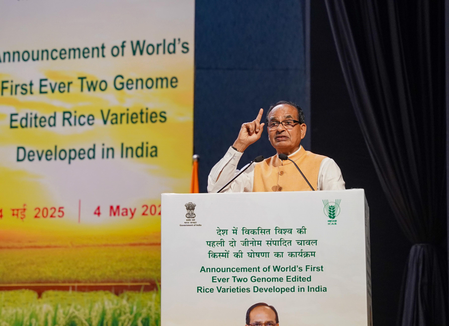New Delhi— Union Agriculture Minister Shivraj Singh Chouhan on Sunday announced a major scientific breakthrough, declaring that India has become the first country in the world to develop genome-edited rice varieties.
The announcement marks a significant milestone in agricultural innovation and sustainability, with the introduction of two new rice varieties—DRR Rice 100 (Kamla) and Pusa DST Rice 1—developed using advanced genome-editing technology.
“These varieties will not only boost agricultural productivity but also contribute to environmental sustainability by conserving irrigation water and reducing greenhouse gas emissions,” the minister said at an event in the capital.
Chouhan credited the achievement to the vision and leadership of Prime Minister Narendra Modi, stating, “India’s journey toward becoming a developed nation is progressing rapidly. Today’s breakthrough in agriculture will be recorded in golden letters.”
He recalled Prime Minister Modi’s call during the Azadi Ka Amrit Mahotsav for Indian farmers to adopt modern technologies to tackle agricultural challenges. “Inspired by his vision, scientists at the Indian Council of Agricultural Research (ICAR) have delivered outstanding results through these new genome-edited varieties,” he said.
Toward a Food-Secure and Sustainable Future
The agriculture minister emphasized the critical need to ensure food security while increasing the production of nutritious crops for both domestic and global markets. “We aim to make India the food basket of the world,” he asserted.
Highlighting India’s growing prominence in agricultural exports, Chouhan noted, “We are proud that Basmati rice exports alone have reached ₹48,000 crore annually.”
Introducing the ‘Minus 5 and Plus 10’ Formula
In a strategic move to optimize land use, Chouhan introduced the “Minus 5 and Plus 10” formula. The initiative aims to reduce the area under rice cultivation by 5 million hectares, while increasing rice production by 10 million tonnes through improved yield and technology. This would, in turn, free up land for cultivating pulses and oilseeds—critical components for nutritional security and reducing import dependency.
He called on farmers, especially the younger generation, to embrace cutting-edge farming practices. “When agricultural scientists and farmers work together, miracles can happen. We must bridge the gap between research and the field,” he urged.
A Scientific Breakthrough with Global Implications
The newly developed rice varieties were created using CRISPR-Cas9-based genome-editing technology, a method that enables precise genetic modifications without introducing foreign DNA. This innovation allows for faster development of climate-resilient and resource-efficient crops.
ICAR scientists believe these varieties could significantly transform Indian agriculture by enhancing yield, improving adaptability to climate stress, and conserving water—an increasingly scarce resource.
This breakthrough positions India as a global leader in agricultural biotechnology, signaling a new era of science-driven, sustainable food production. (Source: IANS)







